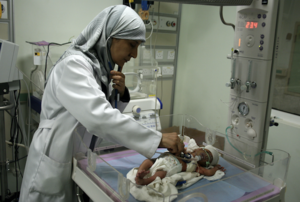Connect with your students over texts that encourage kindness and self-care in the face of widespread health concerns.
The CommonLit team is here to help schools that are coping with closures related to COVID-19. CommonLit is 100% free for teachers, students, and parents.
Check out our recent blog posts about:
- digital features to support remote learning,
- recommended content for teleschool, and
- tips for turning any CommonLit lesson into a video lesson.
Children and adults alike are very aware of the COVID-19 outbreak and its impact on our everyday lives. With school and district closings across the country, it’s hard not to be. During these uncertain times, it is particularly paramount to reach out to students, peers, friends, and loved ones to check in on them and remind them that we’re all in this together.
To counter the challenges arising from school closings, CommonLit wants to provide as much support as possible to teachers, students, and parents. That’s why we’ve compiled relevant texts for students to read about human kindness, disease, health, and self-care in light of the rampant coronavirus.
Below are 10 great texts from various grade levels that teachers and parents can assign to students to remind them about what’s important during a pandemic:
3rd-4th Grade:
“A Space is More Than Just a Space” by Isaac Akinkunmi
In this informational text, students learn about three different kinds of spaces: public, private, and personal. While each space has its own qualities and defining features, Akinkunmi concludes the text by explaining that all spaces should be treated with respect to keep them safe and fun.
When you assign your students this text, incorporate their parents/guardians into the lesson by having them spark a discussion about spaces. Send an email out to your students’ parents/guardians and have them ask their children the following questions: Why is it important for people to feel comfortable and safe in public, private, and personal spaces? Think about what’s going on in the world right now; what do you think people can do to feel comfortable and safe in their public, private, and personal spaces?

“Working at the Hospital” by Barbara Radner
This short text by Barbara Radner briefly reviews the several roles that exist within hospitals and discusses the many necessary tasks to ensure that patients stay healthy, safe, and cared for. From nurses and receptionists to doctors and cooks, there are a lot of people involved in making sure that hospitals run smoothly.
Have your students read Radner’s text, and then ask their parents/guardians to watch this video about hospital employees with them. This clip by Monroe Carell Jr. Children’s Hospital at Vanderbilt reviews the various people who are involved with a child’s stay at the hospital. Encourage parents/guardians to engage their children in a conversation afterwards about the important work all hospital workers are doing to fight the spread of COVID-19.
You can also find the Spanish version of this lesson here.
5th-6th Grade:

“The Rose That Grew from Concrete” by Tupac Shakur
Tupac Shakur was an African American rapper, actor, poet, and activist known for his influential compositions. This poem by Shakur is a beautiful piece about a rose that grows despite the odds against it, a story that serves as a metaphor for the rise and growth of an individual in the face of adversity. Shakur’s description of the rose reflects its resilience and ability to rise above hardship, characteristics that could also be used to describe a human overcoming a great challenge.
Given the issues posed by the spread of the COVID-19 virus, Shakur’s poem can serve as a reminder to students that they are capable of rising above the problems they are facing today. To connect with your students on this lesson as you work remotely, you can use our customizable annotation task. Ask your students to make an annotation at the end of the poem that answers the following questions: Have you ever felt like a “rose that grew from concrete,” as described by Tupac Shakur? If so, what was the difficult situation that you faced, and how did you rise above it? If not, who is someone else you might describe as a “rose that grew from concrete”? What makes them similar to this rose?
“Explainer: Animals’ Role in Human Disease” by Amanda Leigh Mascarelli
As news spreads about the coronavirus, students may have questions about how exactly viruses are passed on from person to person. While COVID-19 has not been conclusively proven to have originated in animals, nor has it been found to be transmitted by animals to humans, it’s helpful for students to learn about what role animals can potentially play in spreading diseases. In this text, Amanda Leigh Mascarelli discusses how humans are affected by animals infected with a virus or bacteria.
After assigning the lesson to your students, post the link for this Related Media video to your Learning Management System (LMS), class webpage, or in an email to your students’ parents/guardians to provide them with an example of how pets can introduce viruses to their owners.
7th-8th Grade:

“What is a vaccine?” by Lindsey Konkel
As doctors and researchers search for a cure to COVID-19, your students can learn about what exactly a vaccine is and how it works. This informational text by Lindsey Konkel will provide students with the definition of a vaccine, as well as how it affects your body.
When assigning this lesson digitally to your students, pair it with the lesson “What the flu does to your body, and why it makes you feel so awful” by Laura Haynes. If you’re a STEM teacher, these texts are a great way to incorporate literacy into your lessons (and vice versa if you’re an English teacher)!
“Five reasons why being kind makes you feel good — according to science” by Jo Cutler, Robin Banerjee
To spread the love during a time of unrest, it helps to explain to students the science behind why being kind can be beneficial for everyone involved. In this informational text, Jo Cutler and Robin Banerjee discuss five reasons why being kind to others makes you feel good.
Before your students complete this lesson, have them watch the Related Media video “Random Acts of Kindness Triathlon: The Science of Happiness.” You can share the link for this video on your LMS, class webpage, or via your students’ parents/guardians email. After watching the video and reading the text, direct your students to answer the following questions in an annotation: Describe the different acts of kindness that the people in the video engage in. How does it affect them? Which of the reasons provided in the text do you think are responsible for why the people in the video felt happier after being kind to others?
9th-10th Grade:

“Self-Care” by Set to Go
It is always beneficial for people to know what they can do to take care of themselves mentally, physically, and emotionally. Particularly during a time of heightened anxiety, it’s important to inform your students about the various ways they can practice self-care. This informational text explores some helpful self-care strategies and the benefits of practicing them.
After your students complete this lesson, instruct them to also watch the Related Media video “A Self-Care Action Plan: How to Adult.” This video will provide more ideas for how students can take care of themselves. Encourage your students to utilize some of these strategies in the coming weeks while classes are remote.
You can also find the Spanish version of this lesson here.
“What the flu does to your body, and why it makes you feel so awful” by Laura Haynes
Your students may be learning a lot about COVID-19 and the various symptoms associated with the virus. Some symptoms are similar to those experienced with the flu and other viruses your students may have had in the past. Take this opportunity to assign Laura Haynes’s text to your students to inform them about what exactly the flu virus does to your body and why it makes people feel so bad.
In the customizable annotation task for this lesson, ask your students to answer the following questions in an annotation at the end of the text: In the text, the author discusses some of the dangers presented by the flu, especially to older people. What can you do to protect yourself against the flu and keep yourself from spreading it around? Thinking about the current coronavirus pandemic, what are some other ways you can also prevent the spread of this new, dangerous virus?
11th-12th Grade:

“How Resilience Works” by Diane Coutu
During times of hardship, learning about what contributes to resilience can help people gain the confidence they need to stay strong and determined. Diane Coutu’s text discusses the three main traits of resilience and the role that it plays in our lives.
When you assign this lesson digitally, personalize your annotation task and instruct students to answer these questions in an annotation at the bottom of the text: In the context of the text, how does fear drive action? How does fear play a role in resilience? How does it contribute to a person’s survival? Cite evidence from this text, other literature, history, or art, as well as any current-day circumstances that you or other people may be experiencing during the COVID-19 pandemic.
“What Fear Can Teach Us” by Karen Thompson Walker
Karen Thompson Walker is an American writer and the author of The Age of Miracles. In this TED Talk, Walker discusses the connection between stories and fear and explains how fear influences the decisions we make.
After completing your lesson, have your students watch Walker’s TED Talk. Through a community post on your class webpage, a video chat with your class, or a Google Doc that can be accessed by all of your students, start a discussion about Walker’s speech; get the conversation started by asking your students the following: In what ways do our fears prepare or fail to prepare us for future events? How much do you agree with Walker’s argument about the effects and the value of fear? When might fear negatively affect a person’s decisions? What connections can you draw between Walker’s arguments and the state of affairs today, given the recent COVID-19 outbreak?
Next Steps
If you’re interested in seeing more texts about human kindness, disease, health, and self-care, check out our CommonLit library to find more lessons on these topics in English and Spanish.
If you’re interested in learning all about CommonLit’s free digital literacy program, join one of our upcoming webinars!


